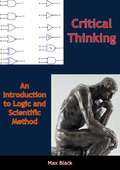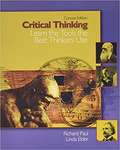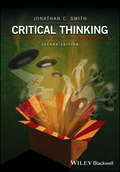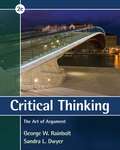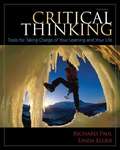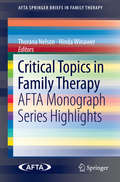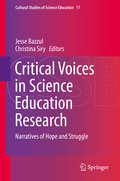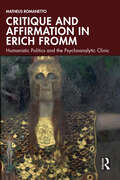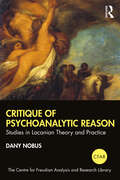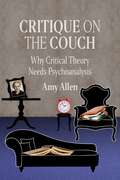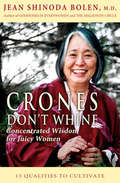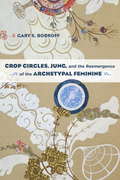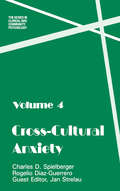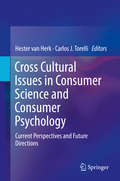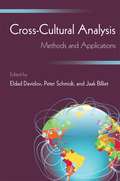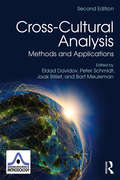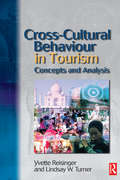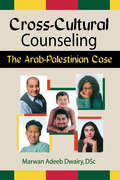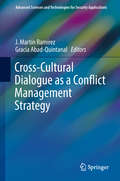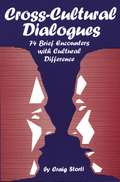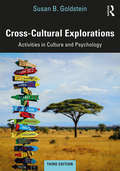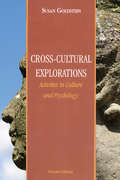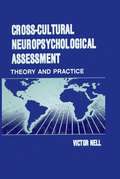- Table View
- List View
Critical Thinking: An Introduction to Logic and Scientific Method
by Max BlackI have tried to make this book an argument, not a catalogue of dogmas. Its ideal reader will find himself constantly asking questions, for which he will insist on finding his own answers. To avoid wasting his time, I have made the fullest use of authentic illustrations from newspapers, books, and other contemporary sources.One of the wisest things ever said about our subject is that “Logic, like whiskey, loses its beneficial effect when taken in too large doses.” While bearing this constantly in mind, I have also aimed at a high level of accuracy and the inclusion of nothing that would have to be unlearnt at a more advanced level of study.This book could never have been written without the help of the students to whom I have lectured on logic and scientific method. My chief obligations are to them.Logic ought to be easy, interesting, and enjoyable. This book will have been successful if it helps some readers to find it so.—Prof. Max Black
Critical Thinking: Learn The Tools The Best Thinkers Use
by Richard Paul Linda ElderWritten by two of the leading experts in critical thinking, this book focuses on an integrated, universal concept of critical thinking that is both substantive and applicable to any and every situation in which human thinking is necessary. It provides readerse with the basic intellectual tools needed for life-long learning, helping them understand the mind and how its three functions — thinking, feeling, motivation — influence and are influenced by one another. This book fosters the development of fair-minded critical thinking. Features the intellectual standards: clarity, precision, accuracy, logicalness, significance, depth, breadth, and fairness; The importance of good questioning; and intellectual tools to read for deep and lasting comprehension, and to write in ways that show clarity of reasonability of thought. For all that want to improve their critical thinking skills to apply to their job or life.
Critical Thinking: Pseudoscience and the Paranormal (Coursesmart Ser.)
by Jonathan C. SmithComprehensive and engaging, this extensively revised edition of a student and instructor favorite introduces the basics of critical thinking using the claims of pseudoscience and the paranormal. Guides readers through the critical thinking process by considering different types of support (sources, logic, and scientific observation) and ruling out alternative explanations Allows students to practice and apply their new critical thinking skills on claims of extraordinary cures including energy treatments, complementary/alternative medicine and faith healing as well as four paranormal claims of consequence: astrology, spiritualism and the afterlife, parapsychology, and creationism. Couples a conversational, nontechnical narrative with student-friendly pedagogical tools, including critical thinking questions and a study guide for each chapter. Provides clear and open-minded discussions of the paranormal spectrum, belief justification surveys, the placebo effect, and the relationship between religion and critical thinking
Critical Thinking: The Art of Argument (Second Edition)
by George W. Rainbolt Sandra L. DwyerWith a complete, approachable presentation, CRITICAL THINKING: THE ART OF ARGUMENT, 2nd Edition, is an accessible yet rigorous introduction to critical thinking. The text emphasizes immediate application of critical-thinking skills to everyday life. The relevance of these skills is shown throughout by highlighting the advantages of basing decisions on a thoughtful understanding of arguments and presenting the overarching commonalities across arguments. With its conversational writing style and carefully selected examples, the book employs a consistent and unified treatment of logical form and an innovative semi-formal method of standardizing arguments that illustrates the concept of logical form while maintaining a visible connection to ordinary speech. Without sacrificing accuracy or detail, the authors have clearly presented the material with appropriate study tools and exercises that emphasize application rather than memorization.
Critical Thinking: Tools for Taking Charge of Your Learning and Your Life (Third Edition)
by Richard Paul Linda ElderFor Student Success and Career Development, or Critical Thinking courses. Written by two of the leading experts in the field, this book's approach to critical thinking is as a process for taking charge of and responsibility for one’s thinking. Critical Thinking is based in theory developed over the last 30 years, it focuses on an integrated, comprehensive concept of critical thinking that is both substantive and practical; it fosters the development of basic intellectual skills students need to think through content in any class, subject, or discipline, as well as through any problem or issue they face. Simply stated, this text offers students the intellectual tools they need for lifelong learning, and rational, conscientious living. In this edition, several advanced chapters were eliminated, many diagrams have been added or enhanced, and the glossary of critical thinking terms has been more strongly developed.
Critical Topics in Family Therapy: AFTA Monograph Series Highlights (AFTA SpringerBriefs in Family Therapy)
by Thorana Nelson Hinda WinawerThis Brief from the American Family Therapy Academy (AFTA) is a collection of chapters from the AFTA Monograph Series. The chapters specifically address responses to a wide range of contextual phenomena from a relational family therapy perspective. Chapters are grounded in family systems concepts and informed by postmodern perspectives including social justice. The collection provides cutting edge thinking and practices for a variety of experiences that strongly impact individuals and families. Authors address the treatment of couples and families oppressed by socio-contextual phenomena such as war and poverty, and of those marginalized by the insidious impact of dominant discourse on relationships and on the therapeutic context, for example, sexual/gender identity and sexual practices. Established practitioners and scholars with particular expertise in the areas addressed bring exceptional transparency and knowledge to the descriptions of their work. Researchers, clinicians, educators, and students of family and couples therapy will find this volume very useful.
Critical Voices in Science Education Research: Narratives of Hope and Struggle (Cultural Studies of Science Education #17)
by Jesse Bazzul Christina SiryThis book is a collection of narratives from a diverse array of science education researchers that elucidate some of the difficulties of becoming a science education researcher and/or science teacher educator, with the hope that through solidarity, commonality, and “telling the story”, justice-oriented science education researchers will feel more supported in their own journeys. Being a scholar and teacher that sees science education as a space for justice, and thinking/being different, entry into this disciplinary field often comes with tense moments and personal difficulties. The chapter authors of this book break into many painful, awkward, and seemingly nebulous topics, including the intersectional nuances of what it means to be a researcher in the contexts of epistemic rigidness, white supremacy, and neoliberal restructuring. Of course these contexts become different depending on how teachers, students, and researchers are constituted within them (as racialized/sexed/gendered/disposable/valued subjects). We hope that within these narratives readers will identify with similar struggles in terms of what it means to desire to “do good in the world”, while facing subtle and not-so-subtle institutional, personal cultural, and political challenges.
Critique and Affirmation in Erich Fromm: Humanistic Politics and the Psychoanalytic Clinic
by Matheus RomanettoCritique and Affirmation in Erich Fromm explores the relations between Erich Fromm’s theory and practice in politics and the psychoanalytic clinic – their points of continuity and contradiction.Drawing on a systematic reading of Fromm's published output, as well as extensive research in the Fromm archives, Matheus Romanetto extracts the fragments of ontology, logic, and ethics implicit in his writings, leading to a re-evaluation of Fromm's place in 20th century intellectual history. Interpolated with the theoretical argument are three historical excursi thematizing Fromm’s practice in political life, religious life, and the psychoanalytic clinic, setting the grounds for a new political sociology of radical humanism and critical theory.Critique and Affirmation in Erich Fromm will be of great interest to psychoanalysts and to scholars of psychoanalytic studies, sociology, contemporary philosophy, political theory, and critical theory.
Critique of Psychoanalytic Reason: Studies in Lacanian Theory and Practice (The Centre for Freudian Analysis and Research Library (CFAR))
by Dany NobusThe highly arcane "wisdom" produced by the French psychoanalyst Jacques Lacan is either endlessly regurgitated and recited as holy writ by his numerous acolytes, or radically dismissed as unpalatable nonsense by his equally countless detractors. Contrary to these common, strictly antagonistic yet uniformly uncritical practices, this book offers a meticulous critique of some key theoretical and clinical aspects of Lacan’s expansive oeuvre, testing their consistency, examining their implications, and investigating their significance. In nine interrelated chapters, the book highlights both the flaws and the strengths of Lacan’s ideas, in areas of investigation that are as crucial as they are contentious, within as well as outside psychoanalysis. Drawing on a vast range of source materials, including many unpublished archival documents, it teases out controversial issues such as money, organisational failure, and lighthearted, "gay" thinking, and it relies on the highest standards of scholarly excellence to develop its arguments. At the same time, the book does not presuppose any prior knowledge of Lacanian psychoanalysis on the part of the reader, but allows its readership to indulge in the joys of in-depth critical analysis, trans-disciplinary creative thinking, and persistent questioning. This book will appeal to researchers and students alike in psychoanalytic studies and philosophy, as well as all those interested in French theory and the history of ideas.
Critique on the Couch: Why Critical Theory Needs Psychoanalysis (New Directions in Critical Theory #73)
by Amy AllenDoes critical theory still need psychoanalysis? In Critique on the Couch, Amy Allen offers a cogent and convincing defense of its ongoing relevance.Countering the overly rationalist and progressivist interpretations of psychoanalysis put forward by contemporary critical theorists such as Jürgen Habermas and Axel Honneth, Allen argues that the work of Melanie Klein offers an underutilized resource. She draws on Freud, Klein, and Lacan to develop a more realistic strand of psychoanalytic thinking that centers on notions of loss, negativity, ambivalence, and mourning. Far from leading to despair, such an understanding of human subjectivity functions as a foundation of creativity, productive self-transformation, and progressive social change.At a time when critical theorists are increasingly returning to psychoanalytic thought to diagnose the dysfunctions of our politics, this book opens up new ways of understanding the political implications of psychoanalysis while preserving the progressive, emancipatory aims of critique.
Crones Don't Whine: Concentrated Wisdom for Juicy Women
by Jean Shinoda Bolen"This juicy, witty, lovely book, shining with Wise Woman candor, is the perfect gift for any woman over 50. I savored it like a rare, well-aged wine, and I know you will too." JEAN SHINODA BOLEN'S GROUNDBREAKING EARLY work-most notably Goddesses in Everywoman- helped a generation of women realize their potential and their value. Half a million copies later, that book still affects the lives of women. In this new book, Crones Don't Whine, Bolen's playful sense of humor and keen insight combine to offer women thirteen qualities to cultivate. Engage in these small practices and you're bound to be a happier person who's doing her bit to make the world a better place. "These qualities are not cultivated overnight," Bolen writes. Crone years are "growing" years, when women can devote their time, energy, and creativity to what really matters to them. Bolen offers us a blueprint: Crones don't whine. They're juicy, and they trust their own instincts. They don't grovel. They do meditate. They choose the path with heart. Crones are fierce about what matters most to them. They speak the truth with compassion. They listen to their bodies, reinvent themselves as needed, and savor the good in their lives. Turn to these thirteen brief pieces again and again, in bad times and good, alone and with others-because "Crones Together Can Change the World," as Bolen points out in an inspirational, call-to-arms bonus essay. "Crones Don't Whine is a delightful and profound handbook for crones and would-be crones filled with wisdom, humor, passion, and just plain good advice. Don't even think of growing old without it!
Crop Circles, Jung, and the Reemergence of the Archetypal Feminine
by Gary S. BobroffThrowing light on the mysterious phenomenon of crop circles within the context of modern psychological reality, Crop Circles, Jung, and the Reemergence of the Archetypal Feminine in an engaging look at the science, history, and symbolic nature of the mystery of these annually occurring giant-scale works of art. Gary S. Bobroff offers a framework for the reader's own deeper consideration of crop circles by examining both the phenomenon itself and the nature of the era into which it has arrived, with special consideration of its relevance to Jungian archetypal psychology.Living in the moment of the death of one worldview and the birth of another, our culture suffers from a hyper-masculine inflation that has us alienated, imagining ourselves to be separate from each other and the earth. Today we are presented with environmental, social, and spiritual crises and mysteries that call us back toward closer participation with the world. Crop Circles--formed in living grain--exemplify the archetypal feminine nature of this moment's change: a calling toward conscious, felt engagement with a dynamic, living, mysterious world. Placing this modern "dream" into the context of modern reality, Crop Circles, Jung, and the Reemergence of the Archetypal Feminine considers what it means to live in an era of strange encounters with energies larger than ourselves.ContentsCHAPTER ONE - BODY OF EVIDENCECHAPTER TWO - WITCHES' RINGS & DEVIL'S TWISTSCHAPTER THREE - GREENING CIRCLESCHAPTER FOUR - ANTIQUE PAGEANTRYCHAPTER FIVE - REASON ALONECHAPTER SIX - A CALLING BACK DOWNCHAPTER SEVEN - THE REALITY OF THE PSYCHECHAPTER EIGHT - GHOSTS OF ELECTRICITYCHAPTER NINE - NEVER MINDCHAPTER TEN - FIELDS OF WAVING CORNACKNOWLEDGMENTSSELECTED BIBLIOGRAPHYNOTES
Cross Cultural Anxiety (Series In Clinical And Community Psychology Ser. #Vol. 4)
by Charles D. SpielbergerFirst published in 1990. Routledge is an imprint of Taylor & Francis, an informa company.
Cross Cultural Awareness and Social Justice in Counseling
by Jon Carlson Cyrus Marcellus EllisMany societal and cultural changes have taken place over the past several decades, almost all of which have had a significant effect on the mental health professions. Clinicians find themselves encountering clients from highly diverse backgrounds more and more often, increasing the need for a knowledge of cross-cultural competencies. Ellis and Carlson have brought together some of the leaders in the field of multicultural counseling to create a text for mental health professionals that not only addresses diversity but also emphasizes the counselor’s role as an advocate of social justice. The theoretical foundation for this book rests on research into diversity, spirituality, religion, and color-specific issues. Each chapter addresses the unique needs and relevant issues in working with a specific population, such as women, men, African Americans, Asian Americans, Spanish-speaking clients, North America’s indigenous people, members of the LGBT community, new citizens, and the poor, underserved, and underrepresented. Issues that enter into the counselor-patient relationship are discussed in detail for all of these groups, with the hope that this will lead to a greater understanding and sensitivity on the part of the counselor for their patients. This is an important and timely book for both counselors-in-training and those already established as professionals in today’s highly diverse and constantly-changing society.
Cross Cultural Issues in Consumer Science and Consumer Psychology: Current Perspectives and Future Directions
by Carlos J. Torelli Hester HerkThis integrative volume identifies and defines cross-cultural issues in consumer psychology and consumer science as the world becomes an increasingly global marketplace. An international panel of experts analyzes current trends in consumer behavior across diverse countries worldwide and across cultural groups within countries, depicting commonly-used cross-cultural frameworks and research methods. Beginning with conceptualizing and quantifying culture at the national level, the volume then moves to individual levels of analysis of consumer decision-making, examining consumer data as they affect business decisions in marketing products internationally. The resulting work synthesizes the consumer science, international business, and consumer psychology literatures for a deeper understanding of all three disciplines and pathways to future research as cultures interact and tastes evolve. Among the topics covered: Culture as a driver of individual and national consumer behavior. Consumer culture-based attitudes toward buying foreign versus domestic products. Country-of-origin effects: consumer perceptions of international products. The roles of cultural influences in product branding. Cultural aspects of consumer-brand relationships. Consumer behavior in the emerging marketplace of subsistence countries. This attention to both national detail and individual nuance makes Cross-Cultural Issues in Consumer Science and Consumer Psychology an instructive and highly useful reference for scholars and students in consumer psychology, cross-cultural psychology, marketing, international business, as well as professionals in these areas.
Cross-Cultural Analysis: Methods and Applications
by Eldad Davidov Peter Schmidt Jaak Billiet Bart MeulemanIntended to bridge the gap between the latest methodological developments and cross-cultural research, this interdisciplinary resource presents the latest strategies for analyzing cross-cultural data. Techniques are demonstrated through the use of applications that employ cross national data sets such as the latest European Social Survey. With an emphasis on the generalized latent variable approach, internationally–prominent researchers from a variety of fields explain how the methods work, how to apply them, and how they relate to other methods presented in the book. Syntax and graphical and verbal explanations of the techniques are included. A website features some of the data sets and syntax commands used in the book. Applications from the behavioral and social sciences that use real data-sets demonstrate: The use of samples from 17 countries to validate the resistance to change scale across these nations How to test the cross-national invariance properties of social trust The interplay between social structure, religiosity, values, and social attitudes A comparison of anti-immigrant attitudes and patterns of religious orientations across European countries. The book is divided into techniques for analyzing cross-cultural data within the generalized-latent-variable approach: multiple-group confirmatory factor analysis and multiple-group structural equation modeling; multi-level analysis; latent class analysis; and item-response theory. Since researchers from various disciplines often use different methodological approaches, a consistent framework for describing and applying each method is used so as to cross ‘methodological borders’ between disciplines. Some chapters describe the basic strategy and how it relates to other techniques presented in the book, others apply the techniques and address specific research questions, and a few combine the two. A table in the preface highlights for each chapter: a description of the contents, the statistical methods used, the goal(s) of the analysis, and the data set employed. This book is intended for researchers, practitioners, and advanced students interested in cross-cultural research. Because the applications span a variety of disciplines, the book will appeal to researchers and students in: psychology, political science, sociology, education, marketing and economics, geography, criminology, psychometrics, epidemiology, and public health, as well as those interested in methodology. It is also appropriate for an advanced methods course in cross-cultural analysis.
Cross-Cultural Analysis: Methods and Applications, Second Edition (European Association of Methodology Series)
by Eldad Davidov Peter Schmidt Jaak Billiet Bart MeulemanIntended to bridge the gap between the latest methodological developments and cross-cultural research, this interdisciplinary resource presents the latest strategies for analyzing cross-cultural data. Techniques are demonstrated through the use of applications that employ cross-national data sets such as the latest European Social Survey. With an emphasis on the generalized latent variable approach, internationally prominent researchers from a variety of fields explain how the methods work, how to apply them, and how they relate to other methods presented in the book. Syntax and graphical and verbal explanations of the techniques are included. Online resources, available at www.routledge.com/9781138690271, include some of the data sets and syntax commands used in the book. Applications from the behavioral and social sciences that use real data-sets demonstrate: The use of samples from 17 countries to validate the resistance to change scale across these nations How to test the cross-national invariance properties of social trust The interplay between social structure, religiosity, values, and social attitudes A comparison of anti-immigrant attitudes and patterns of religious orientations across European countries. The second edition includes six new chapters and two revised ones presenting exciting developments in the literature of cross-cultural analysis including topics such as approximate measurement invariance, alignment optimization, sensitivity analyses, a mixed-methods approach to test for measurement invariance, and a multilevel structural equation modeling approach to explain noninvariance. This book is intended for researchers, practitioners, and advanced students interested in cross-cultural research. Because the applications span a variety of disciplines, the book will appeal to researchers and students in: psychology, political science, sociology, education, marketing and economics, geography, criminology, psychometrics, epidemiology, and public health, as well as those interested in methodology. It is also appropriate for an advanced methods course in cross-cultural analysis.
Cross-Cultural Behaviour in Tourism: Concepts And Analysis
by Lindsay Turner Yvette Reisinger, PhDCross-Cultural Behaviour in Tourism: Concepts and Analysis is important reading for those in the following areas of industry: * Tourism: illustrates the importance of cultural background in the tourist experience and how it is a major determinant in repeat visitation * Marketing: provides an understanding of the cultural background of a destination that is vital when formulating successful marketing strategies * Management: provides valuable examples on how cultures influence tourist behaviour and decision-making, helping managers to develop cross-cultural skills and deal with tourists from diverse cultural backgrounds Tourism is a service industry where people from different nationalities meet. In today's international marketplace it is imperative that those in the industry understand the influence of national cultures on their consumers in order to compete successfully for a market share. The book is accompanied by online resources which can be found at www.bh.com/companions/0750656689. These resources include an account of Hypothesis Testing, together with a detailed glossary and a comprehensive reference list of relevant materials.
Cross-Cultural Counseling: The Arab-Palestinian Case
by Frank De PianoAs a therapist, you may find yourself at a brick wall when you try to treat Middle Eastern, North African, South American, Asian, and other clients with psychotherapeutic techniques formulated in the West. As Cross-Cultural Counseling: The Arab-Palestinian Case illustrates, the construction of self, community, and society is remarkably different in Arab countries. Only certain aspects of Western psychotherapy can be adapted to respond to the unique sociopolitical conditions and cultural factors affecting the mental health of people raised to consider community needs over self needs and desires. This text suggests a biopsychosocial approach to treating psychological disorders among Arab clients and highlights differences in the prevalence and manifestation of psychological disorders among peoples of South/Eastern backgrounds, as compared to what is known in the West. You’ll gain an education and understanding from Cross-Cultural Counseling that helps you provide more effective services to Arabs and Palestinians to meet their mental health needs. Cross-Cultural Counseling shows you how divesting therapeutic techniques of cultural sensitivity results in the alienation of clients who are not accustomed to recognizing or meeting their individual needs. It suggests a biopsychosocial approach to treating psychological disorders among Arab clients and highlights differences in the prevalence and manifestation of psychological disorders among peoples of South/Eastern backgrounds, as compared to what is known in the West. Challenging therapists to discard their misconceptions and biases about people who don’t fit the Western mold in terms of individualization, identity, and personality, the book also covers: different sociopolitical situations in Arab countries and the maintenance of authoritarian and collectivistic culture psychocultural features of Arabs socialization in Arab homes and schools help-seeking behavior among Arabs and poor mental health service delivery in Arab countries factors threatening the unity of the Palestinian family therapeutic recommendations for traditional clientsAccording to author Marwan Dwairy, Cross-Cultural Counseling is meant to “undo the dehumanization that has surrounded Palestinian-Arabs and help clinicians to understand the behavior of the Arab client and come to know the person in him or her.” Certainly, no other book can help you, as a psychologist, psychiatrist, or mental health professional, treat Palestinians, Arabs, and other South/Eastern clients as efficiently and successfully.
Cross-Cultural Dialogue as a Conflict Management Strategy (Advanced Sciences and Technologies for Security Applications)
by J. Martín Ramírez Gracia Abad-QuintanalThis book contributes to the current knowledge and research on conflict and cross-cultural dialogue, emphasizing how respect, tolerance and dialogue may be quite effective tools for bridging the diverse cultures and, consequently, for solving many of the conflicts of today’s world, characterized by a dynamic interchange of populations with very diverse cultural and ethnic backgrounds. For this purpose, we rely on reputed scholars from ten different countries, and from different cultures and fields of expertise, which allows for diverse contributions from a valuable interdisciplinary perspective. The first section of the book deals with the correlation between cultural differences and conflict, while also showing how such conflicts can be prevented and, should they arise, managed and solved. The second section addresses a different, more specific issue: how cultural expression means and tools for cultural communication may lead to conflict whereas they may help to avoid it as well. Finally, the third section analyzes how legal and justice systems deal with cross-cultural conflicts as well as with situations which may lead to cross-cultural conflicts, thus assessing to which extent such systems contribute to avoid and/or solve such kind of conflicts.
Cross-Cultural Dialogues
by Craig StortiCulture affects everything we do: the simplest phrase can be so steeped in cultural context that even seemingly innocent exchanges between people are loaded with cultural differences waiting to expand into misunderstanding and tension. In response, Cross-Cultural Dialogues: 74 Brief Encounters with Cultural Difference offers a collection of 74 brief conversations between an American and people from other cultures, spanning nearly every major region of the world. Each dialogue is categorized as a social, workplace or business interaction and contains at least one breach of cultural norms, which the reader is then challenged to address. Even the most careful reader will be caught off guard by some of the dialogues' hidden subtleties. Storti is meticulous in his analysis of each dialogue, pinpointing not only the moment when the interaction goes wrong, but also identifying the cultural reasons behind each participant's point of view. Whether training others or adding to your own cultural awareness, Cross Cultural Dialogues is an excellent resource, encouraging readers to engage in the world and increase their multicultural understanding.
Cross-Cultural Dialogues: 74 Brief Encounters with Cultural Difference
by Craig StortiCulture affects everything we do: the simplest phrase can be so steeped in cultural context that even seemingly innocent exchanges between people are loaded with cultural differences waiting to expand into misunderstanding and tension. In response, Cross-Cultural Dialogues: 74 Brief Encounters with Cultural Difference offers a collection of 74 brief conversations between an American and people from other cultures, spanning nearly every major region of the world. Each dialogue is categorized as a social, workplace or business interaction and contains at least one breach of cultural norms, which the reader is then challenged to address. Even the most careful reader will be caught off guard by some of the dialogues' hidden subtleties. Storti is meticulous in his analysis of each dialogue, pinpointing not only the moment when the interaction goes wrong, but also identifying the cultural reasons behind each participant's point of view. Whether training others or adding to your own cultural awareness, Cross Cultural Dialogues is an excellent resource, encouraging readers to engage in the world and increase their multicultural understanding.
Cross-Cultural Explorations: Activities in Culture and Psychology
by Susan B. GoldsteinIt is only in recent decades that psychology as an academic discipline has begun to recognize the importance of a cultural perspective. From cross-cultural psychology through to psychological anthropology, psychologists have taken a number of approaches to studying the role of culture in human behavior. This comprehensive workbook is designed to facilitate students’ understanding and application of major concepts and principles of culture and psychology. The fully updated new edition features over 100 case studies, self-administered scales, mini-experiments, and library research projects, addressing topics such as culture, race/ethnicity, gender, age, sexual orientation, disability, and social class. Theoretical and guiding content is included in each chapter to embed the activities within key concepts and principles. In addition, the workbook is supported by a substantial Instructor’s Manual that includes discussion questions, video recommendations, variations by course level, and suggestions for expanded writing assignments. Designed to contribute to the inclusion of cultural perspectives in the psychology curriculum, this wide-ranging book provides students with hands-on experiences that facilitate the understanding and application of major concepts and principles in the study of culture and psychology.
Cross-Cultural Explorations: Activities in Culture and Psychology
by Susan GoldsteinThis activities workbook is designed to facilitate students' understanding and application of major concepts and principles in the study of culture and psychology. The 90 activities in this workbook feature a wide range of engaging case studies, self-administered scales, mini-experiments, and library research projects, addressing topics such as culture, race/ethnicity, gender, age, sexual orientation, disability, and social class. Background material is included for any concepts not commonly addressed in introductory texts. In addition, the workbook is supported by a substantial Instructor's Manual that includes discussion questions, video recommendations, variations by course level, and suggestions for expanded writing assignments.
Cross-Cultural Neuropsychological Assessment: Theory and Practice
by Victor NellThis is a book for all neuropsychologists who are called upon to assess culturally different clients--with very few exceptions today, this means every neuropsychologist. In Minneapolis as in Oslo, migrant and refugee minorities raise assessment and test validity problems that cannot be ignored. To deal realistically with the problem of doing neuropsychological assessments without norms, Nell describes the principles of a "behavioral neuropsychology," and then sets out interview, test, and interpretation methods that will allow clinicians to produce valid and prognostically accurate assessments. For working neuropsychologists, this is an intensely practical, how-to-do-it book. But unlike other hands-on guides, it lays an impressive historical and theoretical foundation for the practice of cross-cultural neuropsychology. It thus speaks to serious practitioners who need to be certain that their assessment findings are not only correct, but also sufficiently well-grounded to stand up to professional scrutiny and to forensic testing in a court of law.
